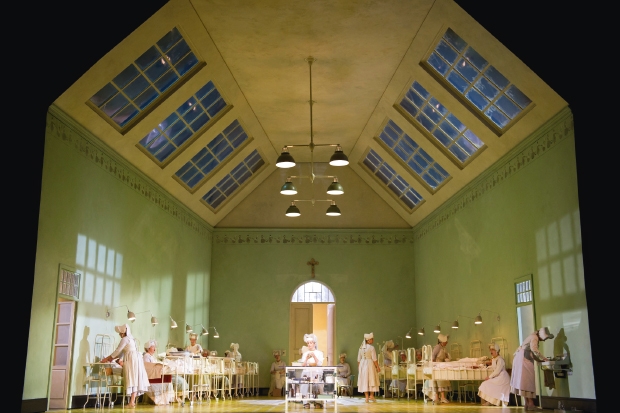The setting for Il tabarro, the first drama in Puccini’s 1918 triptych of one-act operas, is not the Paris of tourists and honeymooners, nor even the Paris of impoverished poets and painters. On a bend in the Seine a Dutch barge is moored at a soot-blackened wharf. A tableau of stevedores and seamstresses unfreezes. Sirens blast through the oily haze of muted violins. A tart touts for trade. There is no romance here: no first love, no new love, no true love. Just ordinary sadness and ordinary yearning: a marriage bruised beyond repair, a dead child kept alive in his father’s memory, and a futile and fatal affair.
The first revival of Richard Jones’s Il trittico sees a new conductor at the helm, Nicola Luisotti, and several key cast changes. On the opening night, the balance was problematic. Luisotti indulges his players at the expense of his singers, who sometimes struggle to keep pace and be heard over the brazen glow of Puccini’s orchestrations. Still, the core is strong. Vocally and theatrically all three works are realised with scrupulous attention to human weakness, the engine of each story. Who are we, for example, to blame Giorgetta (Patricia Racette) for wanting to escape the floating prison of her marriage and the airless confines of a space ‘between the bed and the stove’ in Il tabarro? Racette is touching, alert to the text and unselfish in her awkward little dance, a weary housewife’s spin on a Josephine Baker routine. She is, however, forced into acting for two opposite Carl Tanner’s brightly sung but opaque Luigi and Lucio Gallo’s quiet-toned Michele.
In Il tabarro, Jean Vigo’s L’Atalante sets the visual mood. In Suor Angelica, we’re with Powell and Pressburger. Crowned with a halo of chiming bells, chaste flutes and radiant strings, Ermonela Jaho holds the anguish of Angelica’s unanswered prayer in her eyes. The characterisation of the supporting roles is carefully detailed, such as Lauren Fagan’s tender delivery of Sister Genovieffa’s wistful monologue on the joy of holding a lamb. There was sourness from the cellos but the confrontation between Angelica and the Principessa (Anna Larsson) is tautly choreographed by revival director Sarah Fahie, and Jaho’s guileless emotionalism in ‘Senza mamma’ and in the shambolic, terrified coda to her self-poisoning is as gripping as anything you might see or hear at the Royal Opera House.
The Donati family has grown in Benjamin Davis’s revival of Gianni Schicchi, but the beehive hairdos, garish prints, cigarette butts, chamber pot, black-and-white television and greasy wallpaper remain. Nella (Rebecca Evans) and Gherardo (Carlo Bosi) now have three children, the most disruptive of which, Gherardino (Felix Colyer), is still driving his toy car into the wall. The physical comedy is broad but the suavity, sexiness and wit of the score is irresistible. Newcomer Susanna Hurrell (Lauretta) soars blissfully over the orchestra in ‘O mio babbino caro’; as does Paolo Fanale (Rinuccio) in ‘Firenze è come un albero fiorito’. Of course, they may end up fat and bickering like their married cousins but it’s worth a gamble. Resplendent in his overalls, Gallo has a spontaneity of expression and movement as Schicchi that is missing in his underpowered Michele. Special credit should go to septuagenarian Gwynne Howell for his deft portrait of Simone, the eldest cousin in this greedy family and, like the rest of them, thoroughly in thrall to Elena Zilio’s Zita.






Comments